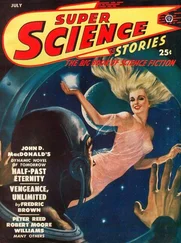Ullister stepped around the body, glanced into the safe. “Time to move,” he said to Shenk.
Shenk yanked the door open and they raced into the hall. Other doors had opened and people peered out fearfully.
Lawrence Hask counted slowly to five, ran into the hall and yelled, “Stop those men!”
The fire door was slowly closing behind the two. He heard their feet on the stairs. He raced to the fire door, hauled it open, pulled it shut, went quickly up two flights. The little wedge of wood still held the tenth-floor fire door open.
He pocketed the wedge, walked down to the bend in the corridor. The service elevator operator looked at him with frightened eyes. “Mister, I heard shots coming up the shaft. I don’t like this.”
Hask tried a calm smile. “Do I look like a killer?”
“Mister, you run around with those smart money boys on eight. I’m stopping with you at the main lobby.”
Hask held the bill where the man could see the denomination. “Suit yourself, friend,” Larry said casually.
“Mister, you go right to the basement.” The man grinned nervously.
Lawrence Hask walked four blocks, took a subway downtown, phoned her from a drugstore, met her twenty minutes later in a cheap restaurant.
In the harsh light she looked older.
Her voice masked by the noise in the restaurant, she said, “Why did you save him? Why did you? It was a deal. Gus was going to give me my freedom if it went through.”
“You have your freedom, baby. Gus is dead.”
He watched the slow waves of shock, and then the deadly satisfaction.
“And thanks for helping me make sure that he got it,” he said.
“Larry,” she said. “You and I, we...”
He stood up slowly, put coffee money on the table. He said, with an enormous weariness in his voice, “My name isn’t Larry and there never was any ‘you and I’ ”...
Ray Logan lay in the hot bright sun of the beach at Acapulco. Sally was beside him.
“Darn it, Ray!” she said. “What made you think I’d wait for a year?”
“You waited, didn’t you?” he asked teasingly.
“But not patiently. And I was so afraid, darling, that you were going to New York to do something foolish about that kid brother of yours.”
He shut his eyes against the sun and it shone red through his eyelids. He said sleepily, “Roger inherited all the craziness in the family. He wanted big thrills and so he started that stupid little numbers racket in New York. The trouble was, the opposition didn’t know he was doing it as a sort of game and that he was going to fold it up after six months and write a book about it.
“Yes, Sally, I did go to New York and I found out which organization had removed Roger. It’s a big organization. I haunted the police and the District Attorney’s office and finally they admitted that they not only didn’t have enough evidence to go on, but they had no chance of getting the evidence.
“The big guns of the group were a man named Lench and a man named Carter. I fooled around for a long time, wondering what to do, and then suddenly I didn’t have to do anything at all.”
“Why, darling?”
“Oh, Mr. Lench got annoyed at Mr. Carter, or the reverse, and they settled their argument by shooting each other and various other people who worked with them.”
Later they swam together in the warm and restless sea, and he wondered if the hot sun would bake away the memories, or if the blue sea would wash them away — and yet he knew that fragments of that year would be always with him, and that no man can take his own vengeance without staining some secret place in his heart.
Even Up the Odds
( Detective Story Magazine , January 1948)
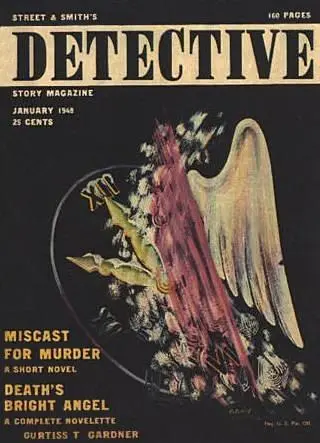
Old Angelo Manini has fired me maybe twenty times and each time all it amounts to is I get a night off from working behind the bar at the Spot Tavern on River Street, which is the joint Angelo has owned for years.
Always it is the same old reason he fires me and the same old reason he hires me back. You see, he gets to reading these magazines on how to run a bar and the first thing I know he is around measuring what is left in bottles and glaring at me and then I am fired and he goes behind the bar. Sure, he can make the drinks, but the Spot Tavern is always loaded with characters spoiling with an urge for fisticuffs and desirous of not paying for drinks.
Angelo is a little old guy with a gray mustache and a nose that twitches and a way of talking very large. Anyway, always he fires me and the neighborhood hears that he is behind the bar and all the characters come around and talk rough to him and he gives away two free drinks for every one paid for, as he is usually nervous of anybody who acts like they want to hit him. Then he begins to think how he would rather be in the back room drinking that red wine and playing some screwy card game with some old guys who come in just to play that game with him. The next day he comes to see me and at twelve noon sharp I am wrapping on the apron and once again Johnny Pepper, which is me, is at the old stand, with that junior baseball bat handy to reach, prepared to handle the business.
It is a Tuesday, about two o’clock in the afternoon, and there is one customer only, and he is asleep with his head on a table, basking in the sunshine which comes in the front window, not so strong maybe, because, as Angelo frequently tells me, the window could be cleaner. But, then, I always say that I am a bartender. I don’t do windows.
Angelo comes in from the back, where he lives in a small room with a cot, a gallon of red and a deck of cards, and says to me, “Today, Johnny, you will please to carry down all the crates of liquor from upstairs and put them in the cellar.”
“I am weary, Angelo,” I say, “but for the consideration of ten dollars, I will do as you ask.”
He jumps up and down while I put my elbow on the bar, my chin on my fist, and stare at him. He yells, “You are to call me Mr. Manini and I order you to do it!”
After he has said that about eight times, I start to take off the apron. He remembers that if I quit he will have to miss out on his game and where can he get another bartender as large and as ugly as Johnny Pepper to scare the customers?
He counts out the ten dollars and I say, “Thank you, Angelo, but why does this have to be done?”
In a tired but proud way he says, “Because the upstairs is rented. This morning only, I rented it to a lady and her husband. They will live up there.”
“Live up there!” I exclaim. “With only a sink, and with holes in the walls and rats like jackrabbits?”
“This afternoon more plumbing goes in and my cousin comes to put boards over the holes and the lady says she will buy rat traps.”
I shrug and he goes back into his back room. I ponder on the housing situation in our town and wonder when Manini will rent his own room and sleep on top of the bar.
They move in the next day, and as it is four o’clock, with business beginning to thicken, I only have time to give one or two looks at the couple. She is a slim type with good clothes, and she stands out in the wind giving orders to the bums who carry up her furniture. The wind plasters her skirt against her and I see that when the customers are drinking, she better stay upstairs with the door locked, as she is built like what my customers dream about on winter nights.
A guy I figure is the husband, a frail type, leans against the side of the truck and smokes cigarettes and does a medium amount of sneering at the bustle which goes on. He looks like the guys in the movies I see, those guys that take the part of the no-good fellow with bad habits, and I wonder if this new guy is running true to form.
Читать дальше
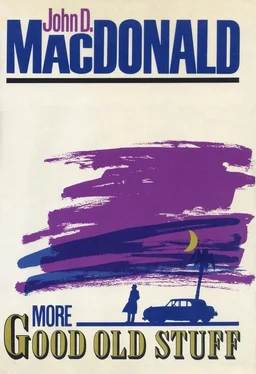

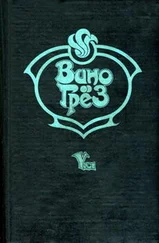
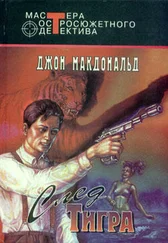
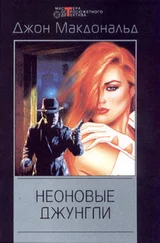

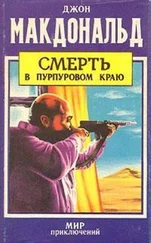



![Джон Макдональд - Wine of the Dreamers [= Planet of the Dreamers]](/books/430039/dzhon-makdonald-wine-of-the-dreamers-planet-of-thumb.webp)

